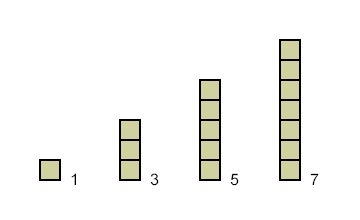In mathematics, a sequence has very important applications. It represents an enumerated collection of objects in which repetitions are allowed in some specific way. Like a set, it contains members or terms. The number of elements in a finite sequence is called the length of the sequence or number of terms. Many times we may create a series from the sequences. Also, there are many popular sequences. One such sequence is Arithmetic Sequence. In this topic, the student will learn about it as well as the Arithmetic Sequence formula with examples. Let us learn the interesting topic!
Definition of Arithmetic Sequence
Formally, a sequence can be defined as a function whose domain is set of the first n natural numbers, constant difference between terms. An arithmetic sequence is a sequence in which each term is created or obtained by adding or subtracting a common number to its preceding term. Therefore, the difference between the adjacent terms in the arithmetic sequence will be the same. An arithmetic progression is a type of sequence, in which each term is a certain number larger than the previous term.
We can compute the sum of the terms in such an arithmetic sequence by using a simple formula. Such formulae are derived by applying simple properties of the sequence. Thus we can see that series and finding the sum of the terms of series is a very important task in mathematics.

Arithmetic sequence formulae are used to calculate the nth term of it. Also, the sum of the terms of a sequence is called a series, can be computed by using formulae.
If the sequence is 2, 4, 6, 8, 10, … , then the sum of first 3 terms:
S = 2 + 4 + 6
S = 12.
Arithmetic Sequence Formula
1] The formula for the nth general term of the sequence
In general, the nth term of the arithmetic sequence, given the first term ‘a’ and common difference ‘d ’ will be as follows:
\(a_n = a + (n – 1)d\)
2] Sum of n terms in the arithmetic sequence
Sum of n terms of the arithmetic sequence can be computed as:
\(S = \frac{n} {2} [2a + (n – 1) d]\)
\(S = \frac{n}{2}(a + l)\)
| \(a_n\) | nth term |
| a | First-term |
| n | Number of terms |
| d | Common difference |
| l | Last term |
| S | Sum of terms |
Solved Examples for Arithmetic Sequence Formula
Q.1: Find the 15th term in the arithmetic sequence given as 0, 2, 4, 6, 8, 10, 12, 14…..?
Solution: The arithmetic sequence is:
0, 2, 4, 6, 8, 10, 12, 14…..?
Thus first term, a = 0
Common difference, d = 2
So, nth term,
\(a_n =a + (n-1)d\)
i.e. \(a_n = 0 + (15-1) \times 2\)
i.e. \(a_n = 28\)
Therefore 15th term in the sequence will be 28.
Q.2: Find the sum of the first 12 odd natural numbers.
Solution: As we know that the required sequence will be:
1, 3, 5, 7, 9, 11….
Which is clearly an arithmetic sequence.
Also, first term, a = 1
Common difference, d = 2
And n =12
Now, formula for sum of n terms in arithmetic sequence is:
\(S = \frac{n}{ 2 } [ 2 \times a+ (n-1) \times d] \\\)
\(S = \frac {12}{2} [ 2\times 1 + (12-1) \times 2 ] = 6 \times [2 + 22 ] \\\)
i.e, S = 144
Therefore sum of first 12 odd natural numbers will be 144.






I get a different answer for first example.
I got Q1 as 20.5
median 23 and
Q3 26